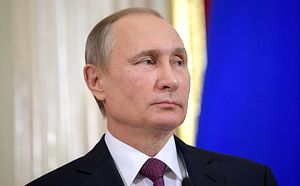Given the twin realities of increasing partisanship and the fact that the Kremlin meddled in the U.S. election to help Donald Trump’s election, it’s perhaps no surprise that Moscow — and Russian President Vladimir Putin, most especially — is viewed a bit more favorably than previously by certain swaths of the American electorate. Indeed, as a new poll from Gallup makes clear, both Moscow and Putin have seen a spike in favorability in the United States over the past few years. However, it’s unlikely Kremlin higher-ups — surprised as they were with Trump’s sudden victory in November — were expecting as substantial a bump as the Gallup numbers make clear.
To be sure, Putin’s and Russia’s numbers are still strongly negative, with 72 percent of Americans viewing Putin unfavorably and 70 percent of Americans saying they maintain negative views of Russia as a whole. However, Putin’s favorability numbers have seen a steady climb over the past two years, with Republican support for the Russian leader nearly tripling, growing from 12 percent in 2015 to 32 percent in early 2017. This growth has come amidst Russia’s attempts to not only interfere in the American election, but as Moscow — from Syria to Ukraine, northern Georgia to Paris and London — has worked to upend the Washington-led order by financing far-right groups, supporting groups organizing Western secessionist movements, and continuing to supply proxy forces in eastern Ukraine. (Indeed, Russia has made a play at becoming something of a leading conservative steward in the West over the past few years.) Likewise, Republicans are far more supportive than Democrats of Russia as a whole, by a margin of 35 percent to 16 percent, respectively.
The poll comes alongside a new NBC/SurveyMonkey survey, which supports much of Gallup’s findings. Per the NBC/SurveyMonkey poll, while an overwhelming majority (80 percent) of Americans continue to view NATO as a net positive for the United States, 35 percent of Americans also view Moscow as either an ally or friendly nation, against 61 percent who view the country as unfriendly or an enemy. (For comparison, 52 percent of Americans view China as an ally or friendly nation, with 45 percent seeing Beijing as an enemy or unfriendly country.)
Once again, these numbers are backed by Republican support for Moscow. Remarkably, GOP supporters are split 50-49 as to whether Russia is a friendly or unfriendly nation for the United States. (Democrats come in with a 23-76 split on the question.) These GOP numbers, interestingly, are buoyed by younger Republicans: Among the 18 to 29-year-old Republican contingent, 73 percent view Russia positively, while only 31 percent of the 65-and-up Republican crowd agree.
All told, the numbers point to a clear improvement of Russia’s standing from a few years prior. However, given that much of the GOP support theoretically stems from pure partisanship — and that relations between Moscow and Washington, one month into the Trump administration, have already begun stalling — support for the Kremlin may already have topped out for the foreseeable future.

































